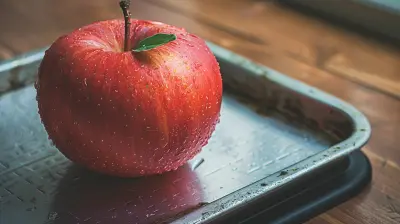Intermittent Fasting and Aging: Slowing Down the Clock
1 November 2025
We all want to age like fine wine, right? Gracefully, slowly, and with our health intact. The thing is, while we can’t hit pause on the clock, we might just be able to slow it down. One of the most buzzed-about lifestyle hacks for anti-aging these days? Intermittent fasting.
Let’s be real—fasting sounds intimidating at first. Going without food on purpose? Wild. But what if skipping a few meals now and then could not only help you shed a few pounds but also make your cells younger, reduce your risk of disease, and keep you sharp as you age?
It’s not just hype. Science is backing up what ancient wisdom has whispered for centuries: fasting might just be the secret sauce for a longer, healthier life.

What is Intermittent Fasting (IF), Anyway?
Before we dive into how intermittent fasting (IF) may slow down aging, let’s break down what it actually is.Intermittent fasting isn’t a diet—it's more like an eating pattern. It doesn’t say what to eat; it tells you when to eat. With IF, you cycle between periods of eating and periods of fasting. Some of the most popular methods include:
- 16/8 method: Fast for 16 hours, eat during an 8-hour window.
- 5:2 method: Eat normally for 5 days a week, and drastically reduce calories on 2 non-consecutive days.
- Eat-Stop-Eat: Do a full 24-hour fast once or twice a week.
It might sound like a fad, but this style of eating has deep roots in human history. Our hunter-gatherer ancestors didn’t have supermarkets or Uber Eats, so going without food for stretches of time was just part of life.

Aging: What’s Really Going On?
So, what exactly is aging? It's more than just wrinkles and gray hair. Aging involves a gradual decline in cellular function, slower metabolism, reduced energy levels, and increased vulnerability to diseases like Alzheimer’s, diabetes, and heart disease.At a microscopic level, aging is about:
- DNA Damage: Over time, our DNA gets damaged. The body tries to repair it, but the system isn't perfect.
- Shortening Telomeres: These are tiny protective caps at the ends of chromosomes. They get shorter with age, and when they’re too short, cells can’t divide anymore.
- Oxidative Stress: Free radicals (unstable molecules) damage our cells, and this builds up over time.
- Inflammation: Chronic, low-grade inflammation speeds up the aging process and is linked to nearly every age-related disease.
Here’s the good news: Intermittent fasting might help tackle several of these issues head-on.

Intermittent Fasting and Anti-Aging: What the Science Says
1. Cellular Cleanup Crew: Autophagy
Ever wish your body had a spring-cleaning mode? Enter autophagy—a fancy word for the process where your cells clean out and recycle damaged parts. It’s like Marie Kondo for your cells.Autophagy helps prevent diseases like cancer and Alzheimer’s by removing dysfunctional components. The problem? It slows down as we age.
But here’s the kicker: fasting turns autophagy back on. Studies show that intermittent fasting can supercharge this natural process, helping your cells stay youthful and efficient.
2. Reduced Oxidative Stress and Inflammation
Free radicals can be like tiny wrecking balls inside your body. Over time, they damage cells and DNA, making aging faster and uglier. Intermittent fasting has been shown to reduce oxidative damage and lower inflammation levels.Think of fasting like giving your body a chance to catch its breath. During fasting windows, your body isn’t constantly digesting food. Instead, it can shift focus to repair and defense—kind of like switching from survival mode to maintenance mode.
3. Improved Mitochondrial Function
Your mitochondria are the powerhouses of your cells—the energy producers. As we age, these mitochondria get sluggish, and energy production drops. IF has been shown to improve the function and quantity of mitochondria, leading to better energy metabolism and cellular performance.It’s like upgrading your body’s batteries—pretty neat, right?
4. Better Insulin Sensitivity
As people age, insulin resistance becomes more common, which can lead to type 2 diabetes and other complications. Intermittent fasting improves your body’s response to insulin, making it easier to keep blood sugar levels in check.Lower blood sugar levels and improved metabolic health aren’t just great for preventing disease—they also help reduce inflammation, which, as we’ve mentioned, is a major aging accelerator.
5. Boosted Hormone Production
Fasting increases the secretion of Human Growth Hormone (HGH), which plays a critical role in cell regeneration, metabolism, and muscle growth. Higher levels of HGH are linked to slower aging, better skin, and increased lean muscle mass.So yes, skipping breakfast might even help you stay swole and smooth.

Brain Gains: IF and Cognitive Health
Ever get that foggy-headed feeling after a heavy meal? Eating all the time can slow your brain down. Intermittent fasting, on the flip side, has been linked to improved brain health, sharper focus, and even protection against neurodegenerative diseases like Alzheimer’s and Parkinson’s.Here’s how:
- BDNF (Brain-Derived Neurotrophic Factor): Fasting boosts this powerful brain hormone that supports learning, memory, and the growth of new neurons.
- Reduced Brain Inflammation: Chronic inflammation messes with cognition. Fasting calms the storm.
- Neuroplasticity: Your brain becomes more flexible, adapting better to new challenges.
In short, intermittent fasting is like HIIT for your brain. It stresses it just enough to make it stronger.
Skin Deep: Can Fasting Help You Look Younger?
Okay, let’s talk vanity. We all care (at least a little) about how we look as we age. While fasting isn’t a magic bullet, it can support skin health in a few key ways:- Reduced inflammation leads to fewer breakouts and less redness.
- Improved insulin sensitivity helps regulate hormones, which can reduce acne.
- Cell regeneration gives your skin that fresh, glowy vibe.
And let’s not forget—IF often contributes to weight loss and reduced bloating. So yeah, you’ll probably feel and look a bit more radiant.
Real Talk: Is Intermittent Fasting for Everyone?
Despite all the exciting benefits, intermittent fasting isn’t a one-size-fits-all solution. Some people thrive on it. Others? Not so much. Here's what to keep in mind:Pros:
- Supports cellular repair and longevity- Helps with weight management
- Improves focus and energy
- May protect against age-related diseases
Cons:
- May cause low energy or irritability at first- Can be stressful on the body if overdone
- Might be unsafe for those with certain medical conditions or eating disorders
Always—seriously, always—check in with your healthcare provider before starting any new eating routine. Especially if you’re on medications, have a chronic condition, or are pregnant or breastfeeding.
Getting Started: Your Mini-Guide to IF
Thinking of giving intermittent fasting a try? Here's a simple starter guide:1. Pick a method: Try 16/8 to start—it’s the most manageable for beginners.
2. Ease into it: Start by delaying breakfast gradually.
3. Stay hydrated: Drink water, black coffee, or herbal tea during fasting windows.
4. Focus on quality: When you do eat, fuel your body with whole, nutrient-rich foods.
5. Listen to your body: If you feel faint, overly irritable, or sick, it may not be for you.
Wrapping it Up: Can Fasting Really Turn Back Time?
While nothing can truly stop aging, intermittent fasting may help you age better. It supports your body’s natural repair systems, enhances brain and cellular health, and might just keep you looking and feeling younger for longer.It’s not magic. It’s biology. By syncing up with your body’s innate rhythms—giving it time to rest, reset, and rejuvenate—you're essentially giving yourself a leg up in the aging race.
So if you're looking for a simple, sustainable way to support healthy aging without popping a dozen supplements or chasing the next diet fad, intermittent fasting could be your golden ticket.
Remember: aging is inevitable, but how you age? That’s up to you.
all images in this post were generated using AI tools
Category:
Intermittent FastingAuthor:

Laurie Barlow
Discussion
rate this article
1 comments
Faith Ellison
Fasting: Because who needs wrinkles, anyway?
November 22, 2025 at 3:40 AM

Laurie Barlow
Absolutely! Fasting can promote cellular repair and reduce oxidative stress, potentially helping to maintain youthful skin.


